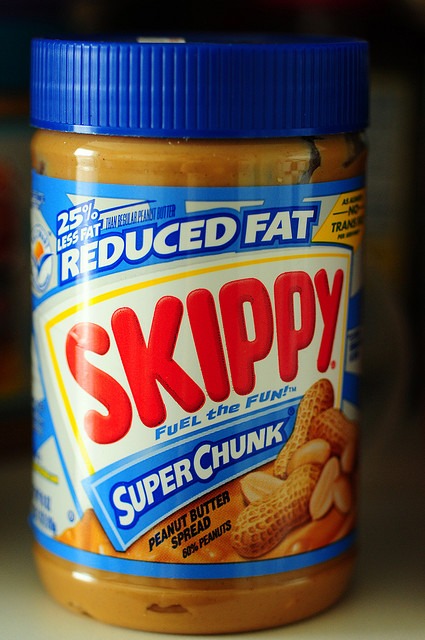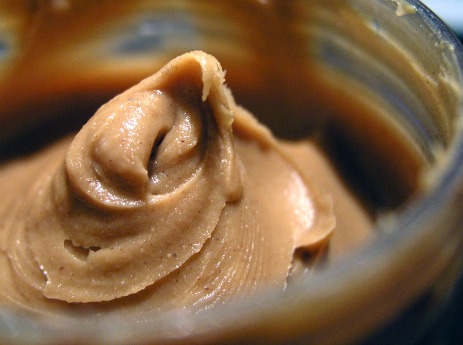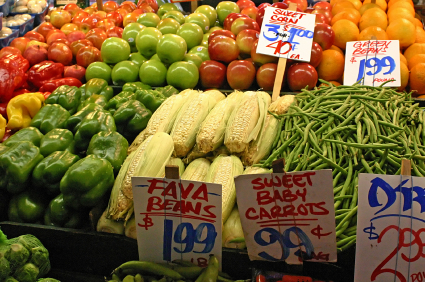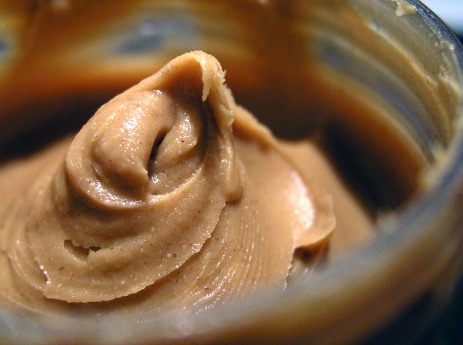 Just say no.Photo: Bill CorCorrected: See below.
Just say no.Photo: Bill CorCorrected: See below.
——
Skippy, a brand owned by European food giant Unilever, has issued a recall of its “reduced fat” peanut butter products. Evidently, they have become tainted with salmonella — an unhappy echo of the widespread 2009 salmonella outbreak from salmonella-tainted “peanut paste.”
But the real scandal with Skippy® Reduced Fat Creamy Peanut Butter Spread and Skippy® Reduced Fat Super Chunk Peanut Butter Spread isn’t that some unwanted pathogen somehow found its way into the finished product. The problem is the stuff that Unilever quite intentionally injects into its “peanut butter spreads” — and takes out.
What do I mean? Let’s look at the ingredients list (which is the same for both the “creamy” and “super chunk” varieties):
Roasted Peanuts, Corn Syrup Solids, Sugar, Soy Protein, Salt, Hydrogenated Vegetable Oils (Cottonseed, Soybean And Rapeseed) To Prevent Separation, Mono And Diglycerides, Minerals (Magnesium Oxide, Zinc Oxide, Ferric Orthophosphate, Copper Sulfate), Vitamins (Niacinamide, Pyridoxine Hydrochloride, Folic Acid)
The products deliver 180 calories per two-tablespoon serving, and 12 grams of fat.
Let’s compare that to another widely available commercial product: Woodstock Organic Peanut Butter. According to its ingredients list, it contains just “Organic dry roasted unblanched peanuts and salt,” with 190 calories per two-tablespoon serving and 15 grams of fat.
In other words, it’s quite possible to mass-produce peanut butter without weighing it down with all manner of additives.
So what is Skippy doing here? Essentially, it’s stripping out a quarter of the fat naturally found in peanut butter and replacing it with sweeteners, thickeners, and partially hydrogenated oil. In total calorie terms, the added sweeteners nearly offset the subtracted fat: the Skippy products have just 10 fewer calories per serving than does Woodstock’s just-peanuts version.
And as Kristin Wartman argued recently, cutting down on fat for its own sake turns out to be a poor strategy for improving your health. Indeed, taken in moderation — such as in a two-tablespoon serving — the peanut oil that Unilever strips out of these products turns out to be quite valuable. It’s rich in monounsaturated fats, which the Mayo Clinic declares to be “healthy.”
 Smooth, but at what cost?Photo: Piccolo NamekAs for the partially hydrogenated oil, there’s simply no excuse for adding it to any product. Overwhelming evidence (see here and here) links it strongly to heart disease. Stripping out healthy fat and replacing part of it with this stuff is imbecilic.
Smooth, but at what cost?Photo: Piccolo NamekAs for the partially hydrogenated oil, there’s simply no excuse for adding it to any product. Overwhelming evidence (see here and here) links it strongly to heart disease. Stripping out healthy fat and replacing part of it with this stuff is imbecilic.
[Correction: A PR person from Unilever wrote in to say that Skippy does not contain partially hydrogenated oil; it contains fully hydrogenated oil. This is a key distinction, because fully hydrogenated oil does not contain heart-ruining trans fats. I had wrongly assumed that the oil must be partially hydrogenated, because food makers usually stress “fully” on their labels. Even so, fully hydrogenated oil is a highly processed product offering little nutritional value, unlike unprocessed peanut oil.]
The food industry would likely respond that it has to add partially hydrogenated oil, because it makes peanut butter “spreadable” by preventing the oil from separating. My answer: Why do people expect peanut butter that you don’t have to occasionally stir to reincorporate the oil? Because the food industry has been generating that expectation by tarting up peanut butter with partially hydrogenated oil for 20 years now. Just stop!
And if you’re a consumer who’s gotten hooked on immediately “spreadable” peanut butter, there’s no need to submit to the industry’s addiction to partially hydrogenated oil. Just find a natural-foods store with one of those contraptions that lets you grind peanut butter from whole peanuts on the spot. The resulting product comes out eminently spreadable, and won’t separate if you finish it within a month or two.
In the end, like no-fat milk goosed up synthetic fat, “reduced fat” peanut butter is a deeply absurd product. The fact that Skippy’s version is now tainted with salmonella is just one more reason to avoid it.




